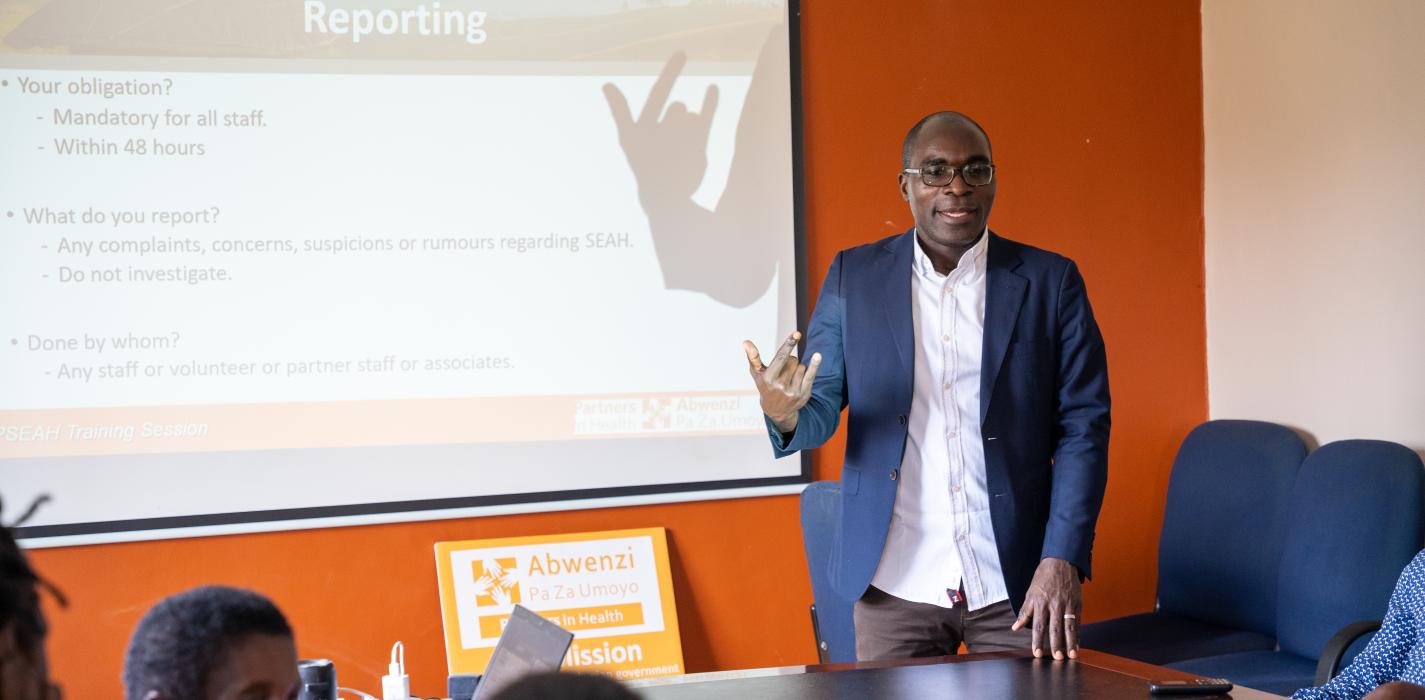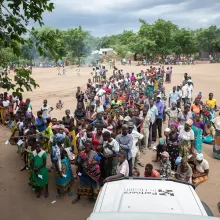Safeguarding

Safeguarding is a critical area within PIH. Safeguarding ensures that all PIH stakeholders are safe from all forms of maltreatment, including SEAH.
Our Impact
Through Safeguarding, PIH has developed a map for available survivor support services in Neno district and Malawi. In addition to that, the program has facilitated the establishment of several reporting and feedback channels currently in use: toll-free line (0884 50 20 20), focal persons/points, PSEAH email address (pseahmw@pih.org).
-
1,693Staff Safeguarding Capacity Building
702 males and 991 females were trained, representing 98% of our target. A refresher training session was conducted in 2024.
-
1,803Awareness Raising among Partners
984 male and 819 female Non PIH staff including MoH, Contractors, Community Partners were trained, representing 88% of our target.
-
5Reporting Channels Established
Reporting channels were established to improve the speed and confidentiality of individuals reporting cases of SEAR and response to safeguarding concerns among staff, donors, partners, and beneficiaries.
Acknowledging that the core mission of PIH is to provide a preferential health care option for the poor in health, safeguarding our staff, associates and beneficiaries from abuse, especially sexual exploitation, abuse and harassment (SEAH) is imperative for PIH Malawi. PIH Malawi acknowledges that its staff members and partners’ staff exist in a privileged social class due to their education, occupation, income and associated social influence. Therefore, PIH Malawi ensures that the poor and vulnerable people are protected from abuse that may result from power imbalance among PIH staff and its stakeholders.
The goal of the Safeguarding Department is to create a conducive organizational environment that is safe from all forms of maltreatment, especially SEAH for all people who are associated with PIH Malawi.
Key Activities
PIH Malawi ensures that as it implements its programs, there is a safe environment for all stakeholders to operate. The three main objectives of the safeguarding department are to:
To strengthen the protection system that improves the prevention of and response to safeguarding concerns among staff, donors, partners and beneficiaries. This is done by:
-Setting up safeguarding systems that improve the prevention of and response to safeguarding concerns among stakeholders.
-Conducting safeguarding risk assessments, safeguarding referral mapping, establishing reporting and feedback channels for example toll-free help line and focal points/persons, joining and strengthening relevant networks at district, national and international levels.
To build capacity and raise awareness among staff, partners and beneficiaries to help better prevent, detect and report safeguarding concerns through:
-Building safeguarding capacity of various stakeholders mostly through training to raise the required safeguarding awareness and competence among staff, partners and beneficiaries.
-Several initial training sessions, refresher trainings, orientations of new staff and awareness-raising activities among various beneficiaries.
-Development, publication and sharing of relevant safeguarding information, education and communication (IEC) materials among staff, partners and beneficiaries.
- To properly respond to and manage safeguarding cases and care for survivors through: -Proper management of safeguarding incidents from the time they are reported through our established reporting mechanisms, throughout professional investigations, until the case is concluded. This concurrently involves the provision of suitable care of the survivors involved.
Impact
In an ongoing commitment to ensuring the safety and well-being of all individuals involved in our programs, PIH Malawi has implemented a range of safeguarding measures. These measures aim to prevent and address incidents of sexual exploitation, abuse, harassment, and other forms of protection concerns.
Our efforts began with the establishment of an up-to-date referral map for safeguarding services. This map serves as a vital resource, enabling swift and coordinated responses to any safeguarding issues that may arise. Additionally, a comprehensive safeguarding risk assessment was conducted, involving all departments and programs. This assessment resulted in the development of a risk and mitigation register, which is actively implemented and tracked.
To enhance accessibility and support, we established a dedicated Safeguarding toll-free help line (+265 884 50 20 20). This confidential helpline provides a safe space for individuals to report concerns and seek assistance. Moreover, we recognize the importance of education and training in creating a safeguarding culture. As such, we have provided training to all staff, community health volunteers, members of established community structures, and various stakeholders. Over 275 Ministry of Health staff, 94 contractor staff, and numerous suppliers of goods and services have also received safeguarding training.
To raise more awareness and promote vigilance, we have developed and shared various safeguarding Information, Education, and Communication (IEC) materials. These materials, including posters displayed in vehicles, offices, and health facilities, serve as visual reminders of our commitment to safeguarding.
Furthermore, we have prioritized the integration and mainstreaming of safeguarding measures across various departments and programs. This includes incorporating safeguarding considerations into recruitment processes, performance management, infrastructure management, transport and logistics, grant development and management, ICT, and Community Health. By embedding safeguarding measures into these areas, we ensure a comprehensive, holistic and sustainable approach to safeguarding.
Incidents of sexual exploitation, abuse, and harassment are managed with utmost care and sensitivity. We have established robust reporting channels to facilitate the appropriate handling of such cases. Through these channels, we ensure that incidents are properly addressed, survivors are supported, and referrals are made as necessary. Our commitment to safeguarding has been recognized, as evidenced by our low risk ranking on sexual exploitation and abuse by UNICEF.
As we continue to strengthen our safeguarding measures, we remain dedicated to creating a safe and respectful environment for all individuals involved in our programs. Through ongoing training, awareness campaigns, and the establishment of reporting mechanisms, we strive to prevent and address any safeguarding concerns.
